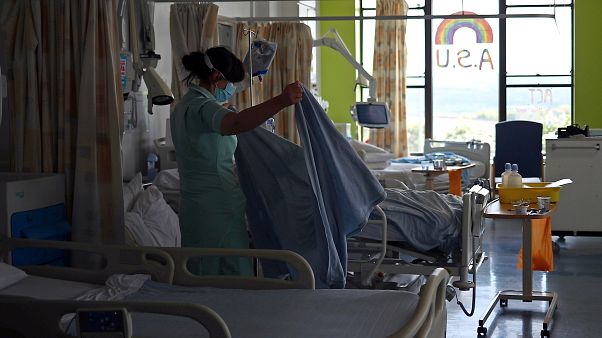Coronavirus: Cases of stroke in young people with COVID-19 emerge in alarming new studies

A health care assistant works on the Acute Stroke Unit at the Royal Blackburn Teaching Hospital in Blackburn, north-west England on May 14, 2020 – Copyright HANNAH MCKAY / POOL / AFP
Researchers have recently reported multiple cases of strokes in young people with COVID-19.
A stroke is when there’s an interruption of a flow of oxygen to the brain. It can often kill brain cells if not treated immediately.
Two separate studies in the New York City area reported that young people were coming in with strokes one to two decades before they would expect to have one.
“The larger strokes are occurring in people who are young largely under the age of 50 and … these patients don’t have what we would call risk factors,” said Dr Adam Dmytriw, a Toronto physician in radiology who focuses on cerebrovascular disease.
Dmytriw was one of the authors on a study of stroke in 10 coronavirus patients in several New York hospitals, at least three of whom were under the age of 50.A fifth of the patients did not have diabetes, hypertension or cardiovascular disease that could put them more at risk for a stroke. Some had mild coronavirus symptoms or were asymptomatic.
Ambooj Tiwari, a neurointerventional surgeon in New York City and author on the same study said that the people without risk factors often worked in professions that encountered “a high concentration of people in a confined space”.Tiwari said in the last week of March and the first week of April they were seeing these types of cases every other day.
Another study published in the New England Journal of Medicine by doctors at Mount Sinai in New York looked at five cases of large-vessel stroke in people under the age of 50.The Mount Sinai doctors said that the five cases they treated over a two week period all tested positive for COVID-19.
Two of the patients in the study, both in their 30s, had no risk factors for stroke.”By comparison, every 2 weeks over the previous 12 months, our service has treated, on average, 0.73 patients younger than 50 years of age with large-vessel stroke,” the Mount Sinai doctors wrote.
Symptoms of a stroke range from the inability to move one side of the body to difficulty speaking or forming words. Some people experience a loss of coordination and signs of vertigo.
The researchers said that some patients delayed treatment due to fears about going to a hospital and being infected with COVID-19.Stroke patients, however, can sustain brain damage within minutes if oxygen is not reaching the brain, but doctors said that if people show up at hospital on time, they can recover almost completely.”I think an extra level of vigilance is required.
A couple of our patients, we had folks who were self-isolating like they were told to, doing everything right and then waking up one day without the ability to move half of their body,” Dmytriw said.The research about strokes, though reported in small groups of patients, is helping doctors to better understand a virus that was originally understood to purely affect the lungs but is now known to potentially affect multiple organs.
Hundreds of children, who were once thought to be largely spared by the virus, for instance, have been diagnosed with an alarming new inflammatory syndrome that can cause heart attack and is thought to be related to coronavirus.”A lot of us on the ground now believe that there’s not one disease.
It’s presenting like a syndrome like HIV also when it was discovered was presenting in different forms and you could never figure out what form would express itself,” Tiwari said.Strokes in coronavirus patients have also been reported in other countries”We have seen patients with stroke associated with COVID-19 in our hospitals in London, and there are reports emerging of similar findings from other European countries,” said David Werring, a neurologist at University College London.
“We reported a series of six people with stroke that we saw in our service in the first half of April 2020,” he said, but, of these people, just one was under the age of 60.”They all had blockage of large brain blood vessels, some in more than one vessel. In five of them the stroke occurred more than a week after the first symptoms of coronavirus,” Werring told Euronews.Some studies in Wuhan, China, found that a small percentage of severe patients had neurologic manifestations of the virus, including a retrospective analysis that showed a 5% incidence of stroke in hospitalised patients.In a letter to the New England Journal of Medicine, doctors in Strasbourg, France, also said they had seen “neurologic” activity in patients with COVID-19 including two asymptomatic patients who had large vessel strokes.According to Werring, stroke appears to be a rarer complication of severe COVID-19.
Some of the patients in London also had blood clots in other areas of the body such as the legs and lungs, something that has become a common feature of severe COVID-19.”The other key observation was of high levels of inflammation in the blood. This suggests that these patients had a ‘hypercoagulable state’ of excessive blood clotting and inflammation as a delayed consequence of COVID-19,” Werring said.This is similar to the blood clotting and inflammatory syndrome reported in children, though the “shock” symptoms in children are quite different.”Both situations show that although COVID-19 usually affects the lungs, in some people with increased inflammation and blood clotting Coronavirus can cause a more generalised illness affecting other body systems,” Werring said.
